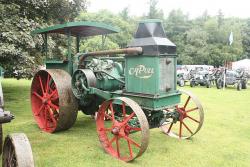Beginning with the blacksmith shop of German immigrant Meinrad Rumely (1823-1904), this successive family of firms invented and produced a line of agricultural equipment that played a vital role in the evolution of farming based on the muscle of humans and animals to one based on the power of the steam and ultimately the internal-combustion engine. The M. & J. Rumely Co. became the M. Rumely Co., and then the Advance Rumely Co. The Allis-Chalmers Company acquired the business in 1931.
Grain


No image dominates the Midwestern landscape like the monolithic grain elevator, whose present shape and construction owe much to grain company operator Frank Peavy and architect-builder Charles Haglin.
Wanting to improve on the flammability and cost of traditional wood-cribbed construction, Peavy speculated that reinforced concrete, in its infancy at the turn of the century, would outperform other materials. But critics feared that the elevator would collapse due to the vacuum created when grain was emptied from the air-tight structure.
Innovations

No image dominates the Midwestern landscape like the monolithic grain elevator, whose present shape and construction owe much to grain company operator Frank Peavy and architect-builder Charles Haglin.
Wanting to improve on the flammability and cost of traditional wood-cribbed…
Read More
Beginning with the blacksmith shop of German immigrant Meinrad Rumely (1823-1904), this successive family of firms invented and produced a line of agricultural equipment that played a vital role in the evolution of farming based on the muscle of humans and animals to one based on the power of…
Read More

